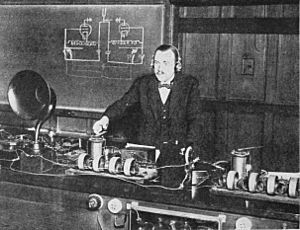William Eccles (physicist) facts for kids
Quick facts for kids
William Eccles
|
|
|---|---|

Eccles displaying radio equipment in 1925
|
|
| Born | 23 August 1875 Barrow-in-Furness, England
|
| Died | 29 April 1966 (aged 90) Oxford, England
|
| Nationality | British |
| Known for | radio |
| Awards | Fellow of the Royal Society |
| Scientific career | |
| Fields | physics |
William Henry Eccles (born August 23, 1875 – died April 29, 1966) was a British physicist. He was a very important person in the early days of radio communication.
Contents
Early Life and Discoveries
William Eccles was born in Barrow-in-Furness, England. After finishing his studies at the Royal College of Science in London in 1898, he started working with Guglielmo Marconi. Marconi was a famous Italian inventor who helped create radio. In 1901, Eccles earned his doctorate degree.
Understanding Radio Waves
Eccles believed in a theory by Oliver Heaviside. This theory said that there was a special layer high in Earth's atmosphere. This layer could bounce radio waves back to Earth. This meant radio signals could travel much farther. This important part of the atmosphere is now called the ionosphere.
In 1912, Eccles had another big idea. He suggested that energy from the sun caused differences in how radio waves traveled. This explained why radio signals changed between day and night. He also studied how storms in the atmosphere affected radio waves. He used special tools called wave detectors and amplifiers in his work.
The Diode Invention
William Eccles also invented the word "Diode". He used it to describe a special glass tube. This tube had two parts inside: an anode and a cathode. Diodes are very important parts in many electronic devices.
After World War I
After World War I, Eccles became very interested in electronic circuits. These are the pathways that electricity follows in devices.
The Flip-Flop Circuit
In 1918, he worked with F. W. Jordan to create something amazing. They patented the flip-flop circuit. This circuit was a huge step forward. It became the basic building block for electronic memory in computers. Think about how your phone or computer remembers things. The flip-flop circuit helped make that possible!
Helping Build Radio Broadcasting
Eccles also played a big role in setting up early radio broadcasting. In 1919, he became a leader in the Imperial Wireless Committee. He helped design one of the first long wave radio stations. He was also involved with the very beginning of the British Broadcasting Company. This company later became the famous BBC in 1922.
Leadership and Recognition
William Eccles was a highly respected scientist. He was a Fellow of the Royal Society (FRS). This is a very high honor for scientists in the United Kingdom. He also led several important scientific groups:
- He was President of the Physical Society from 1928 to 1930.
- He was President of the Institution of Electrical Engineers (IEE) in 1926.
- He was President of the Radio Society of Great Britain (RSGB) from 1923 to 1924.
William Eccles passed away in Oxford.
 | John T. Biggers |
 | Thomas Blackshear |
 | Mark Bradford |
 | Beverly Buchanan |

